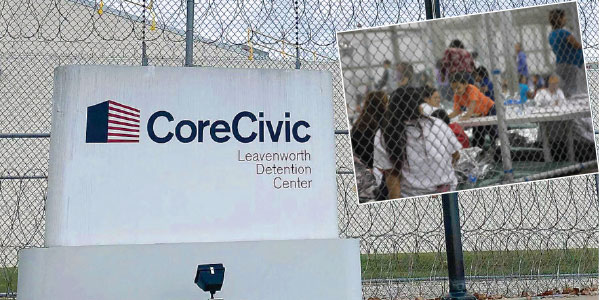
By Roberta Pardo
Leavenworth, Kansas, has filed a lawsuit against CoreCivic.
As reported by multiple media outlets, the city is claiming the private prison operator is attempting to reopen a closed detention facility without obtaining a special-use permit. Filed March 31, the lawsuit claims CoreCivic lost its grandfathered exemption to operate the dentition center after it had closed in 2021.
Judy Ancel – president of the Cross Border Network, one of the organizations opposed to reopening the prison – said the prison was shut down after an investigation had found “horrific” human rights violations there.
“Just all sorts of things that did not meet even the lowest standards of the federal government, so it was shut down and it’s been empty ever since,” she said.
Earlier this year, multiple media outlets reported that CoreCivic wanted to reopen the facility to turn it into a U.S. Immigrations and Customs Enforcement detention center. But certain facilities that haven’t operated for one year must reapply for a special-use permit, per city ordinance. The reapplication process includes holding multiple public hearings.
CoreCivic applied for the special-use permit in February, but before the first public hearing, the company withdrew its application and changed the language used to discuss the issue, according to Esmie Tseng, communications director at ACLU Kansas.
“I think it’s really something that I’ve seen that I think got missed is how CoreCivic sort of changed how they were talking about it,” Tseng said. “They used to say ‘reopening’ on their website. The facility used to be called ‘inactive.’ They deleted a bunch of that language from their website when they withdrew from the permit. … It’s clear they were sort of reframing how they talked about reactivating.”
On April 17, community members and activists held a press conference thanking the city of Leavenworth for filing the lawsuit. Speakers included two former CoreCivic officers, William Rogers and Marcia Levering, who spoke about their experiences working there.
“I think a lot of them … felt really strongly that the city should stand up and not let CoreCivic just bypass the democratic process, but I think still were pleasantly surprised that they filed the lawsuit when CoreCivic did try to sort of open and ramp up hiring and clearly were trying to expedite their ability to kind of hold people in the center,” Tseng said.
CoreCivic has agreed not to resume operations through June 1.
Leavenworth demanda a CoreCivic por la reapertura de su centro de detención
L
eavenworth, Kansas, ha presentado una demanda contra CoreCivic.
Como reportaron varios medios de comunicación, la ciudad alega que el operador privado de la prisión intenta reabrir un centro de detención cerrado sin obtener un permiso de uso especial. Presentada el 31 de marzo, la demanda alega que CoreCivic perdió su exención para operar el centro de detención tras su cierre en 2021.
Judy Ancel, presidenta de la Red Transfronteriza, una de las organizaciones que se opone a la reapertura de la prisión, declaró que esta fue clausurada después de que una investigación encontrara violaciones “horribles” de derechos humanos.
“Se cometieron todo tipo de actos que no cumplían ni siquiera con los estándares más bajos del gobierno federal, por lo que fue clausurada y ha estado vacía desde entonces”, declaró.
A principios de este año, varios medios de comunicación reportaron que CoreCivic quería reabrir las instalaciones para convertirlas en un centro de detención del Servicio de Inmigración y Control de Aduanas (ICE, por sus siglas en inglés). Sin embargo, ciertas instalaciones que no han operado durante un año deben volver a solicitar un permiso de uso especial, según la ordenanza municipal. El proceso de renovación de la solicitud incluye la celebración de varias audiencias públicas.
CoreCivic solicitó el permiso de uso especial en febrero, pero antes de la primera audiencia pública, la empresa retiró su solicitud y modificó el lenguaje empleado para abordar el tema, según Esmie Tseng, directora de comunicaciones de la ACLU de Kansas.
“Creo que algo que he visto y que se pasó por alto es cómo CoreCivic, en cierto modo, cambió su forma de hablar del tema”, dijo Tseng. “Solían decir ‘reapertura’ en su sitio web. Antes, la instalación se llamaba ‘inactiva’. Eliminaron gran parte de ese lenguaje de su sitio web cuando retiraron el permiso… Es evidente que estaban replanteando su forma de hablar sobre la reactivación”.
El 17 de abril, miembros de la comunidad y activistas ofrecieron una conferencia de prensa para agradecer a la ciudad de Leavenworth por presentar la demanda. Entre los oradores se encontraban dos exfuncionarios de CoreCivic, William Rogers y Marcia Levering, quienes hablaron sobre sus experiencias trabajando allí.
“Creo que muchos de ellos… creían firmemente que la ciudad debía actuar y no permitir que CoreCivic simplemente eludiera el proceso democrático, pero creo que aun así les sorprendió gratamente que presentaran la demanda cuando CoreCivic intentó abrir y aumentar la contratación, y claramente intentaban agilizar su capacidad para mantener a la gente en el centro”, dijo Tseng.
CoreCivic ha acordado no reanudar sus operaciones hasta el 1 de junio.









